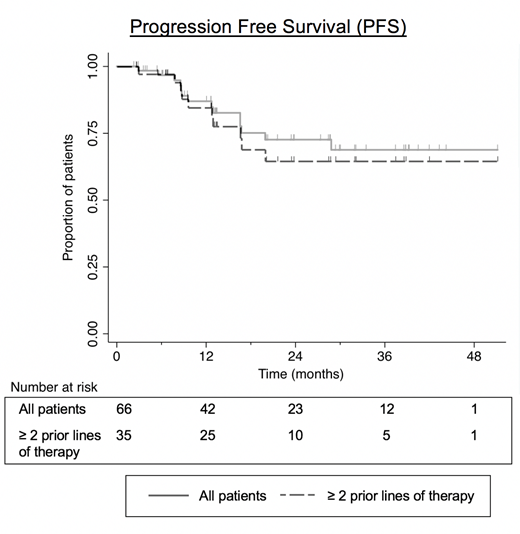Background: Patients with advanced indolent non-Hodgkin lymphoma (iNHL) can develop chemoresistance and most relapse following standard therapy. Although multiple treatment options exist, most are associated with short remission or intolerable side effects. Lenalidomide activates NK cells ± T cells and leads to in vivo expansion of immune effector cells in NHL models. The combination of rituximab and lenalidomide (R2) in relapsed iNHL is highly active and was recently approved. Obinutuzumab is a glycosylated type II anti-CD20 molecule with enhanced affinity for the FcγRIIIa receptors leading to improved ADCC. The primary objective of this phase I/II study was to determine the maximum tolerated dose (MTD), safety, and efficacy of lenalidomide and obinutuzumab in relapsed indolent lymphoma.
Methods: Patients with relapsed small lymphocytic lymphoma (SLL), marginal zone, and follicular lymphoma (gr 1-3a) were eligible. Patients enrolled in three predefined dose cohorts of lenalidomide (10mg,15mg, 20mg) given on days 2-22 of a 28 day cycle. Obinutuzumab was given at a fixed dose (1000mg) IV on days 1,8,15 and 22 of cycle 1 and day 1 of subsequent cycles for 6 cycles. The combination was given for up to 12 cycles in responding pts. Antihistamines were given in pts who developed rash. Prophylactic growth factor was not allowed. In the absence of progression or toxicity, single agent obinutuzumab was continued every 2 months for maximum of 30 months on study. Traditional 3+3 dose escalation was used with dose limiting toxicities (DLT) assessed during cycle 1. Once the MTD was established, 60 additional patients were enrolled in the phase II portion of the study. Adverse events were graded using CTCAE version 4.03.
Results: 66 pts were enrolled between May 2014 until March 2019, and all are eligible for safety and response assessment. No DLTs were observed in dose escalation, and 60 pts were enrolled in the phase II portion of the study at 20mg of lenalidomide daily. Histologies included follicular lymphoma (FL) n=57, marginal zone n=4, SLL n=5. The median age was 64 (36-81), with 2 (1-5) median prior lines of treatment. For 53% of pts, the combination represented the third or greater line of treatment. The overall response (OR) rate for all pts was 98% with 72% attaining a complete response (CR). Eighteen pts (27%) had a partial response, and stable disease was noted in 1 (2%). At a median follow up of 17 months, 14 pts have progressed, with an estimated 24mo progression-free survival (PFS) of 73% (57-83% 95% CI). The estimated 24 mo PFS for ≥ third line pts was 63%. Twenty five pts (38%) remain on treatment and 95% remain alive at last follow up. The most common grade ≥ 3 non-hematologic toxicities included fatigue (5 pts), rash (4 pts), and cough (3 pts). Grade ≥3 neutropenia and thrombocytopenia occurred in 11 (17%) and 7 (11%) pts respectively. Two pts stopped treatment due to adverse events, including 1 transient bradycardia and 1 grade 3 fatigue.
Conclusion: The combination of 20 mg of lenalidomide and 1000mg obinutuzumab is safe and effective in patients with relapsed indolent lymphoma. Adverse events appeared similar to our prior experience with lenalidomide and rituximab and were generally well tolerated. Overall response rates were high, with many pts achieving prolonged remission, including pts who had relapsed after 2 or more lines of prior therapy. Validation studies in the frontline and salvage setting are ongoing.
Fowler:Celgene: Membership on an entity's Board of Directors or advisory committees, Research Funding; Roche: Membership on an entity's Board of Directors or advisory committees, Research Funding; Janssen: Membership on an entity's Board of Directors or advisory committees, Research Funding; Novartis Pharmaceuticals Corporation: Consultancy; TG Therapeutics: Membership on an entity's Board of Directors or advisory committees, Research Funding; ABBVIE: Membership on an entity's Board of Directors or advisory committees, Research Funding. Nastoupil:TG Therapeutics: Honoraria, Research Funding; Novartis: Honoraria; Janssen: Honoraria, Research Funding; Spectrum: Honoraria; Gilead: Honoraria; Genentech, Inc.: Honoraria, Research Funding; Bayer: Honoraria; Celgene: Honoraria, Research Funding. Westin:Novartis: Other: Advisory Board, Research Funding; Celgene: Other: Advisory Board, Research Funding; Juno: Other: Advisory Board; Janssen: Other: Advisory Board, Research Funding; Kite: Other: Advisory Board, Research Funding; Unum: Research Funding; MorphoSys: Other: Advisory Board; Genentech: Other: Advisory Board, Research Funding; Curis: Other: Advisory Board, Research Funding; 47 Inc: Research Funding. Neelapu:Precision Biosciences: Consultancy; Merck: Consultancy, Research Funding; Cellectis: Research Funding; Novartis: Consultancy; BMS: Research Funding; Karus: Research Funding; Acerta: Research Funding; Poseida: Research Funding; Kite, a Gilead Company: Consultancy, Research Funding; Incyte: Consultancy; Celgene: Consultancy, Research Funding; Unum Therapeutics: Consultancy, Research Funding; Allogene: Consultancy; Pfizer: Consultancy; Cell Medica: Consultancy.
Author notes
Asterisk with author names denotes non-ASH members.


This feature is available to Subscribers Only
Sign In or Create an Account Close Modal